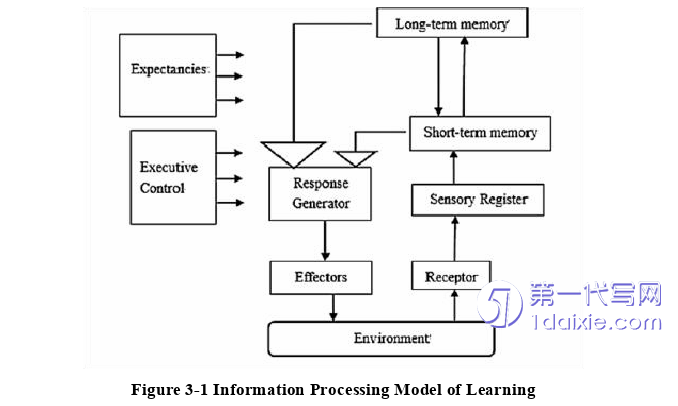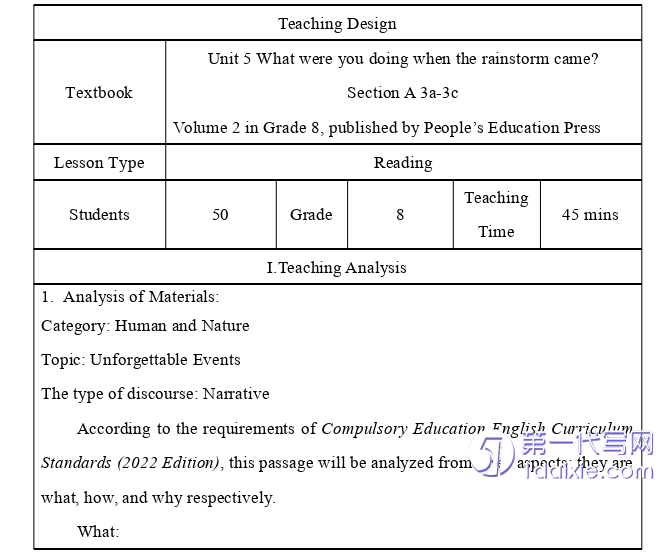本文是一篇英语论文,本研究以信息加工理论和建构主义理论为理论基础,根据J.H.Flavell提出的元认知策略的概念和O’Malley&Chamot对元认知策略的分类为依据,旨在提高中学生的英语阅读成绩和英语阅读兴趣。
Chapter One Introduction
1.1 Research Background
Listening,speaking,reading,and writing are four important skills in Englishlearning.Among them,reading is an important skill for students to obtain languageinformation.Reading not only helps students acquire knowledge,broadens theirhorizons,enhances their thinking abilities,but also expands their vocabulary,learnsthe writing styles of others,and acquires the language needed to express theirthoughts.Reading teaching is a fundamental part of English teaching.Especially inthe basic education stage,reading is highly valued.It is a question that requiresin-depth consideration how teachers can help students improve their reading abilitiesthrough reading classes.It is found that English teachers still have an incorrectunderstanding of reading teaching objectives,and reading classes emphasize more onteaching language knowledge points without emphasizing the cultivation of students’English reading skills,strategies,and good reading habits(Xie,2017).
As an effective learning strategy,meta-cognitive strategies is fertile ground forimproving students’learning efficiency.It is obvious that accepting meta-cognitivestrategies training,students are capable of formulating English reading learning goalsand plans,monitoring the reading process,and evaluate their gains and shortcomingsin the learning.Based on this training,it is evident that students’meta-cognitiveawareness may be improved.Furthermore,the improvement of meta-cognitiveawareness and meta-cognitive ability can tip the balance in favor of students’Englishreading scores and English reading interest.

1.2 Research Purpose
Compulsory Education English Curriculum Standards(2022 Edition)points outthat learning ability refers to the awareness and ability to actively use English learningstrategies,expand English learning channels,and strive to improve English learningefficiency.The development of learning ability is favorable to helping students masterscientific learning methods and cultivating lifelong learning habits.
This advocacy is closely related to the needs of China’s social development.Faced with the challenges of the new century and the rapid development of scienceand technology,a person’s knowledge learned in school alone is no longer sufficientto support his long-term development in society.In future development,lifelong learning ability will become a fundamental ability that a person must possess.Thisshows that enabling students to learn how to learn in the basic education stage is avery important issue.
It plays a really important role to apply meta-cognitive strategies in Englishreading.It can not only enhance students’enthusiasm and initiative in learning,butalso help them establish learning goals and develop learning plans,monitor their ownreading process,evaluate their reading results and methods,find out problems in thereading process and make improvements.Moreover,it is also beneficial to cultivategood reading habits and improve their reading abilities.Only combining thecultivation of meta-cognitive abilities with the entire process of English reading canstudents’reading ability be ultimately improved.
Chapter Two Literature Review
2.1 Meta-cognition
This section focuses on the definition and classification of meta-cognition,andwhich one used in this research is also explained.
2.1.1 The Definition of Meta-cognition
The term meta-cognition was first proposed by American psychologist J.H.Flavell(1979)in his book Cognitive Development.He defines that meta-cognition isknowledge of individual’s cognitive processes and results.Afterwards,he makesrevisions based on this definition.Brown(1987)insists that meta-cognition isconstituted of two components:meta-cognitive knowledge and meta-cognitivemonitoring,and regards meta-cognition as the ability to test,adjust,and evaluateindividual thinking.Nelson(2000)considers that meta-cognition has the ability toconstruct ideas and help cognitive subjects recognize their own psychologicaldevelopment.Liu Fan(1984)regards that meta-cognition is an individual’s cognitionand guidance of their cognitive activities.Zhu Zhixian(1986)proposes thatmeta-cognition is a monitoring of individual thinking activities.Dong Qi(1989)points out that meta-cognition refers to an individual’s perception and regulation ofthe external world.
2.2 Meta-cognitive Strategies
After Flavell proposed the concept of meta-cognition,many scholars haveconducted researches on meta-cognitive strategies.The following is a discussionabout the definition and classification of meta-cognitive strategies.
2.2.1 The Definition of Meta-cognitive Strategies
Since J.H.Flavell proposed the concept of meta-cognition in the 1970s,foreignscholars have conducted relevant researches based on it,gradually forming asystematic theory of meta-cognition.After that,researchers such as Brown,O’Malley,and Oxford combined meta-cognitive theory with learning strategies to conductresearches on meta-cognitive strategies.
Brown(1987)believes that meta-cognitive strategies are individuals’selfplanning,monitoring,and evaluation.It can promote learning activities towardssuccess.O’Malley and Chamot(1990)argue that meta-cognitive strategies are the planning,monitoring,and self-assessment of learning activities by students.Oxford(1990)regards that meta-cognitive strategies refer to the management of students’learning processes,such as the ability to develop learning plans based on their actualneeds.Ellis(1994)insists that meta-cognitive strategies are able to make learners useplanning,monitoring,and evaluation strategies to manage their cognitive processes.Wenden(1998)insists that the purpose of meta-cognitive strategies is to help studentsexamine their own learning activities and thinking processes.Cohen(2000)points outthat meta-cognitive strategies consist of three parts:planning,monitoring andevaluation.Learners can improve their cognitive abilities by monitoring their learningprocess.
Chapter Three Theoretical Basis ......................... 22
3.1 Information Processing Theory ............................. 22
3.2 Constructivism Theory ................................ 26
Chapter Four Research Methodology ............................. 30
4.1 Research Questions ..................................... 30
4.2 Research Subjects ................................... 30
Chapter Five Results and Discussion ................... 50
5.1 Results of Students’ English Reading Scores ................. 50
5.1.1 Results of Pre-test in EC and CC ............................ 50
5.1.2 Results of Post-test in EC and CC .................... 51
Chapter Five Results and Discussion
5.1 Results of Students’English Reading Scores
The purpose of the test in this study is to record the changes in students’scores,and to find out whether there has relation between meta-cognitive strategies andstudents’English reading scores through comparative analysis of two tests scores.Both test papers are from the entrance examination of senior high school Englishpaper in Xinjiang.It is worth noting that students in two classes need to fill out thetest papers at the same time.After the test,the data of the two tests will be collectedand analyzed.The entire analysis process is completed by SPSS 27.0 software.
5.1.1 Results of Pre-test in EC and CC
In order to ensure that the reading levels of the students are close,the authorconduct a pre-test on the students in both classes.In the pre-test,it is of greatnecessity for students to complete the English reading test paper at the same time,which is from the entrance examination of senior high school English paper inXinjiang in 2021.The reading paper consists of four passages,each question with 2points,with 20 questions and a total score of 40 points.The table 5-1 is the results ofpre-test in EC and CC.

Chapter Six Conclusion
6.1 Major Findings
This research introduces the core concept of meta-cognitive strategies,systematically reviews relevant researches on meta-cognitive strategies in Englishreading at home and abroad,and fully demonstrates the advantages of combiningmeta-cognitive strategies with English reading teaching.At the same time,based onthe current condition that English teachers do not attach enough importance to readingstrategy teaching in English reading and the requirements of Compulsory EducationEnglish Curriculum Standards(2022 Edition),combined with the teaching model ofmeta-cognitive strategies proposed by Xiao(2011),the author has designed readingteaching that includes meta-cognitive strategies.The entire teaching model combinesthe planning strategy,monitoring strategy,and evaluation strategy of meta-cognitivestrategies with the three stages of pre-reading,while-reading,and post-reading inreading teaching,and proposes different learning tasks in each teaching stage.Thepre-reading stage is to cultivate students’use of planning strategies,and the goal ofthis stage is to stimulate their meta-cognitive awareness.During the while-readingstage,students should to monitor their own cognitive activities.In the post-readingstage,it is necessary to develop students’ability to use evaluation strategies,in orderto help them realize their own shortcomings in the reading process,make thereflection,and summarize relevant experiences.After a-four-month experiment,based on the results of data analysis,the following two major findings can be drawn.
reference(omitted)
